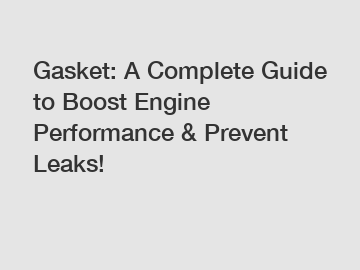Feb. 09, 2024
Mechanical Parts & Fabrication Services
NNK are exported all over the world and different industries with quality first. Our belief is to provide our customers with more and better high value-added products. Let's create a better future together.
When it comes to ensuring optimum engine performance and preventing leaks, the humble gasket plays a crucial role. A gasket is a mechanical seal that fills the gaps between various parts in an engine to prevent the passage of fluid or gas. With their ability to create leak-proof connections, gaskets serve as the unsung heroes of your engine. In this comprehensive guide, we'll explore the importance of gaskets, their types, materials, and maintenance tips to maximize engine performance and reliability.
Chapter 1: Understanding the Importance of Gaskets.

A well-functioning engine relies on the efficient circulation of fluids and gases. Gaskets create a secure seal between different components, such as cylinder heads, intake and exhaust manifolds, oil pans, and water pumps, ensuring the proper flow of fluids and gases. By preventing leaks and maintaining optimal pressure, gaskets contribute to smoother engine operation and enhanced performance.
Chapter 2: Types of Gaskets.
There are various types of gaskets available, designed specifically to suit different engine components and their requirements. Common types include:
1. Engine Cylinder Head Gaskets: Responsible for sealing the combustion chambers, these gaskets play a vital role in maintaining compression, preventing leakage between cylinders, and ensuring the efficient flow of coolant and oil.
2. Exhaust Manifold Gaskets: These gaskets create a seal between the exhaust manifold and the cylinder head, preventing the leakage of exhaust gases. They are crucial for maintaining engine performance and reducing emissions.
3. Intake Manifold Gaskets: Sitting between the intake manifold and the cylinder head, these gaskets ensure that the air-fuel mixture reaches the combustion chambers efficiently, optimizing engine performance and fuel efficiency.
4. Valve Cover Gaskets: Valve covers protect the valves and camshafts from dirt and debris. Gaskets used in valve covers prevent oil leaks and maintain the required pressure for proper lubrication.
Chapter 3: Gasket Materials.
Choosing the right gasket material is essential for guaranteeing longevity, reliability, and leak prevention. Here are some commonly used materials:
1. Rubber Gaskets: Ideal for sealing joints that require flexibility, rubber gaskets provide excellent resistance against oil, heat, and chemicals. They are commonly used for valve covers and oil pans.
2. Metallic Gaskets: Made from steel or copper, metallic gaskets provide robust sealing solutions for high-temperature applications. They can withstand extreme pressures and are often used in the exhaust and intake manifold.
3. Composite Gaskets: Combining the best properties of rubber and metal, composite gaskets are known for their versatility. They are commonly used in applications where both flexibility and temperature resistance are required.
Chapter 4: Gasket Maintenance Tips.
To ensure the continued performance and reliability of your engine, it's essential to maintain the integrity of your gaskets. Follow these maintenance tips:
1. Regular Inspection: Inspect gaskets for signs of wear, such as cracks, tears, or breaks. Replace them immediately if any damage is detected.
2. Proper Torque: When replacing gaskets, always use the manufacturer's recommended torque specifications. Over-tightening or under-tightening can lead to leaks or gasket failure.
3. Fluid Compatibility: Ensure that the gasket material is compatible with the fluids used in your engine. Using incompatible fluids can cause deterioration and premature failure of gaskets.
4. Clean Surfaces: Before installing a new gasket, clean the mating surfaces thoroughly to remove any debris or residue. A clean surface ensures a proper seal and prevents leaks.
Conclusion.
Gaskets may be small components, but they play a critical role in maintaining engine performance, preventing leaks, and ensuring optimal fluid and gas flow. By understanding the different types, materials, and maintenance tips, you can enhance the functionality and longevity of your engine. So, pay attention to gaskets, and your engine will thank you with efficient and reliable performance!
If you want to learn more, please visit our website.
For more china farm machinery oil seal supplierinformation, please contact us. We will provide professional answers.
Previous: How can you tell the difference between bearings?
Next: Which 2 Position Hydraulic Selector Valve Offers Ultimate Control?
If you are interested in sending in a Guest Blogger Submission,welcome to write for us!
All Comments ( 0 )